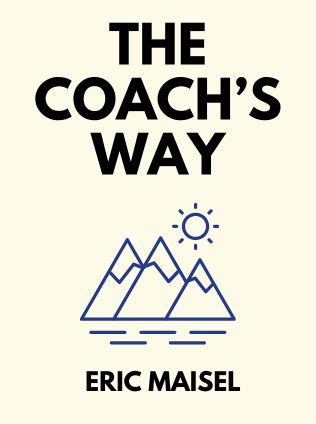
The Coach’s Way
The Art and Practice of Powerful Coaching in Any Field
By Eric Maisel
Published 04/2023
About the Author
Eric Maisel is a distinguished figure in the field of coaching and personal development. With a PhD in counseling psychology, he has spent decades studying the intricacies of human behavior and the art of helping others. Maisel is known for his practical and accessible writing style, which has made him a popular author and speaker at events like the International Authority for Professional Coaching & Mentoring (IAPC&M). His work is deeply influenced by the principles of Taoism, particularly the concepts of naturalness, spontaneity, and connection. Maisel believes that there is an authentic path each individual can walk, and his mission as a coach is to help others find and walk their path with ease and authenticity.
Main Idea
"The Coach's Way" delves into the essence of what it means to be a professional coach. Maisel presents coaching as a powerful tool for personal and professional development, emphasizing the importance of effective communication, deep connection, and genuine understanding. The book is not just for professional coaches but for anyone in a helping role, such as parents, teachers, managers, and counselors. Maisel argues that at its core, coaching is about creating a safe and supportive space where individuals can explore their thoughts, feelings, and aspirations. This process involves both the coach and the coachee engaging in a meaningful dialogue that can lead to transformative change.
Table of Contents
- Starting with You
- Your Working Philosophy
- Before the First Session
- The First Session
- Between Session 1 and Session 2
- The Second Session
- Quiet Energetic Presence
- Asking Quality Questions
- Drop-Ins
- Effortless Work
- In Session
- On Progress
- The Work Over Time
- Conclusion
Starting with You
The foundation of effective coaching begins with self-awareness. Maisel emphasizes that coaches must first understand themselves before they can effectively assist others. This initial self-awareness involves recognizing one's strengths, weaknesses, and personal biases. Maisel suggests that coaches should regularly engage in self-reflection and personal growth activities to maintain a clear and unbiased perspective. He posits that the authenticity and presence of a coach are crucial in establishing a strong and trusting relationship with the client.
Maisel also discusses the importance of creating a relaxed and open environment in coaching sessions. He believes that a coach's demeanor and approach significantly influence the client's comfort level and willingness to open up. A key aspect of this is the coach's ability to be fully present and attentive, free from distractions or preconceived notions. By doing so, coaches can foster an environment where clients feel safe to explore their thoughts and emotions deeply.
Your Working Philosophy
Every coach operates from a unique set of beliefs and values that shape their approach to coaching. Maisel refers to this as the "working philosophy" and stresses its importance in guiding a coach's interactions with clients. He encourages coaches to be explicit about their philosophy and to continually refine it based on their experiences and learning.
Maisel highlights several core components that should be part of a coach's working philosophy. These include a belief in the potential for growth and change, an understanding of the complexity of human nature, and a commitment to ethical practices. He also emphasizes the importance of a coach's perspective on purpose and meaning, as these concepts often play a significant role in the coaching process. According to Maisel, a coach's philosophy should reflect a deep respect for the client's individuality and a recognition that each person's journey is unique.
"I am working with real people, in all their richness, darkness, and complexity." - Eric Maisel
Before the First Session
Preparation is crucial for a successful coaching session. Maisel outlines the steps coaches should take before meeting a new client, which include gathering relevant information and reflecting on the client's potential needs and challenges. This preparation allows the coach to approach the session with a clear understanding of the client's background and goals, enabling a more focused and effective coaching process.
Sign up for FREE and get access to 1,400+ books summaries.
You May Also Like
The Subtle Art of Not Giving a F*ck
A Counterintuitive Approach to Living a Good Life
By Mark MansonRich Dad Poor Dad
What the Rich Teach Their Kids About Money - That the Poor and Middle Class Do Not!
By Robert T. KiyosakiHow To Win Friends and Influence People
The All-Time Classic Manual Of People Skills
By Dale CarnegieFreakonomics
A Rogue Economist Explores the Hidden Side of Everything
By Steven D. Levitt and Stephen J. Dubner



















